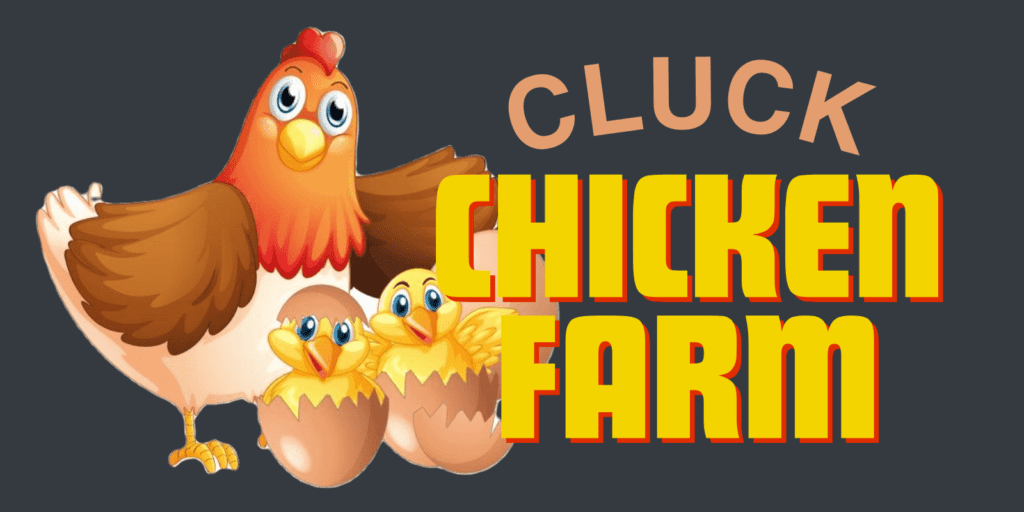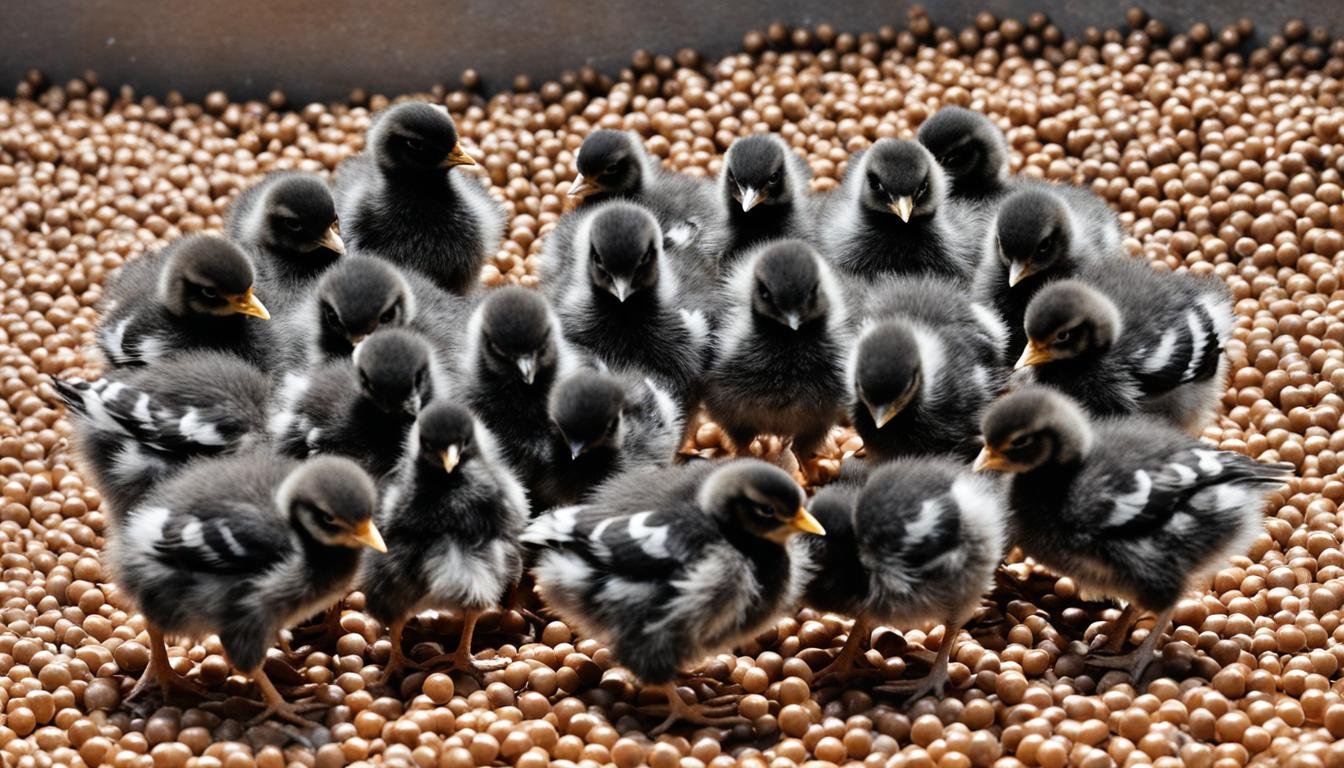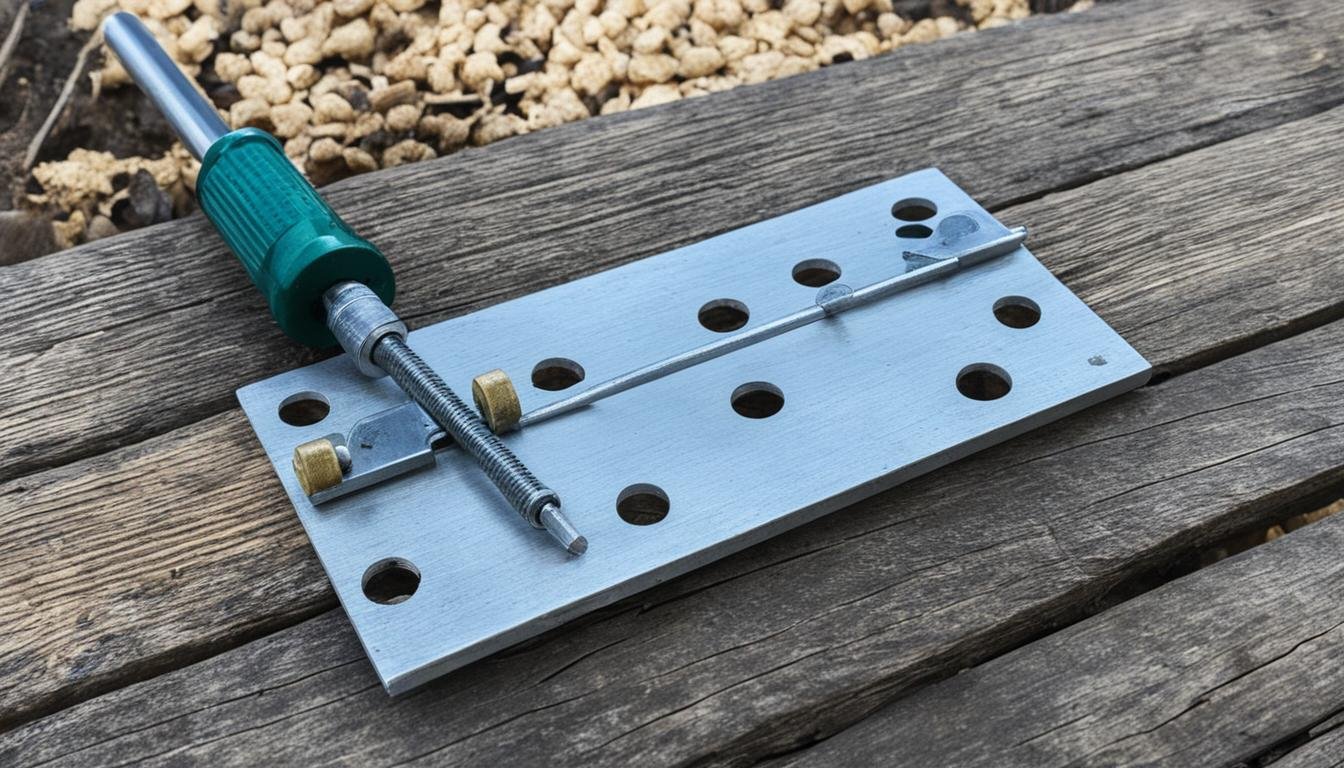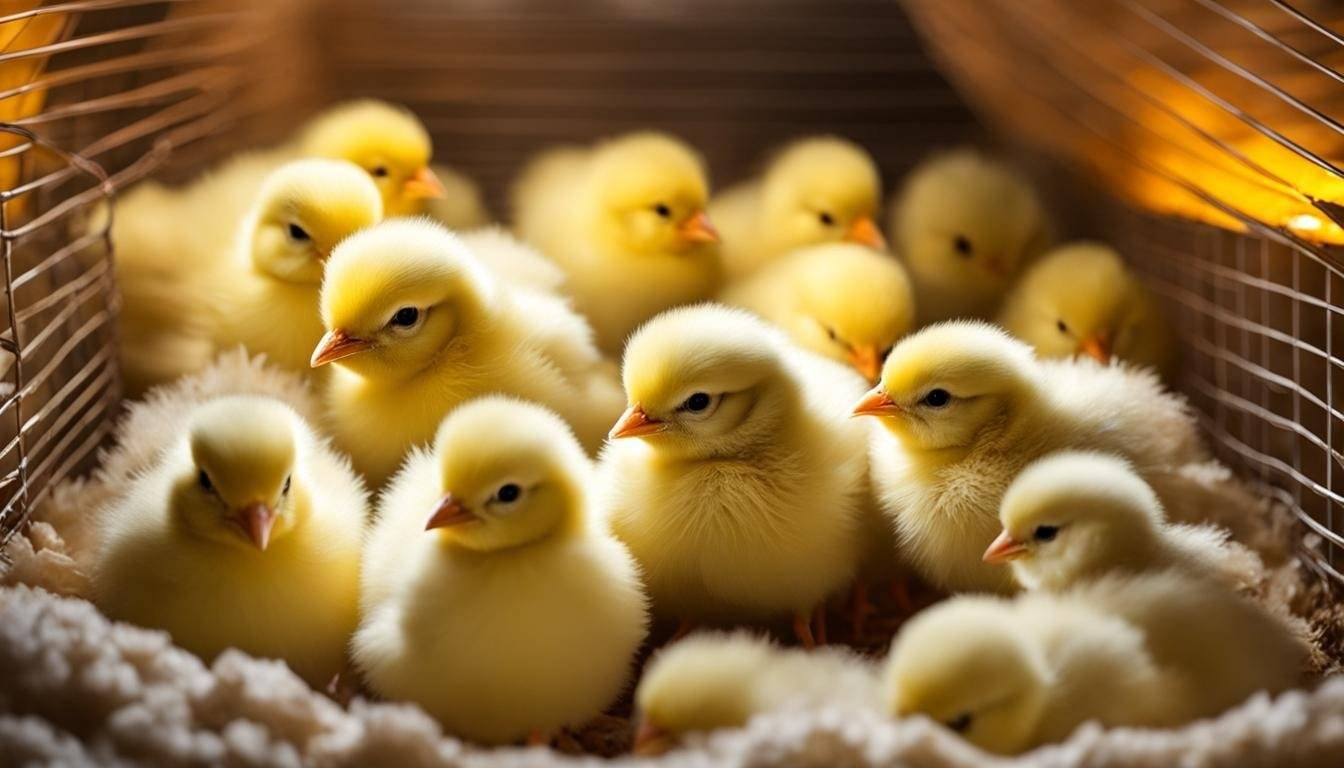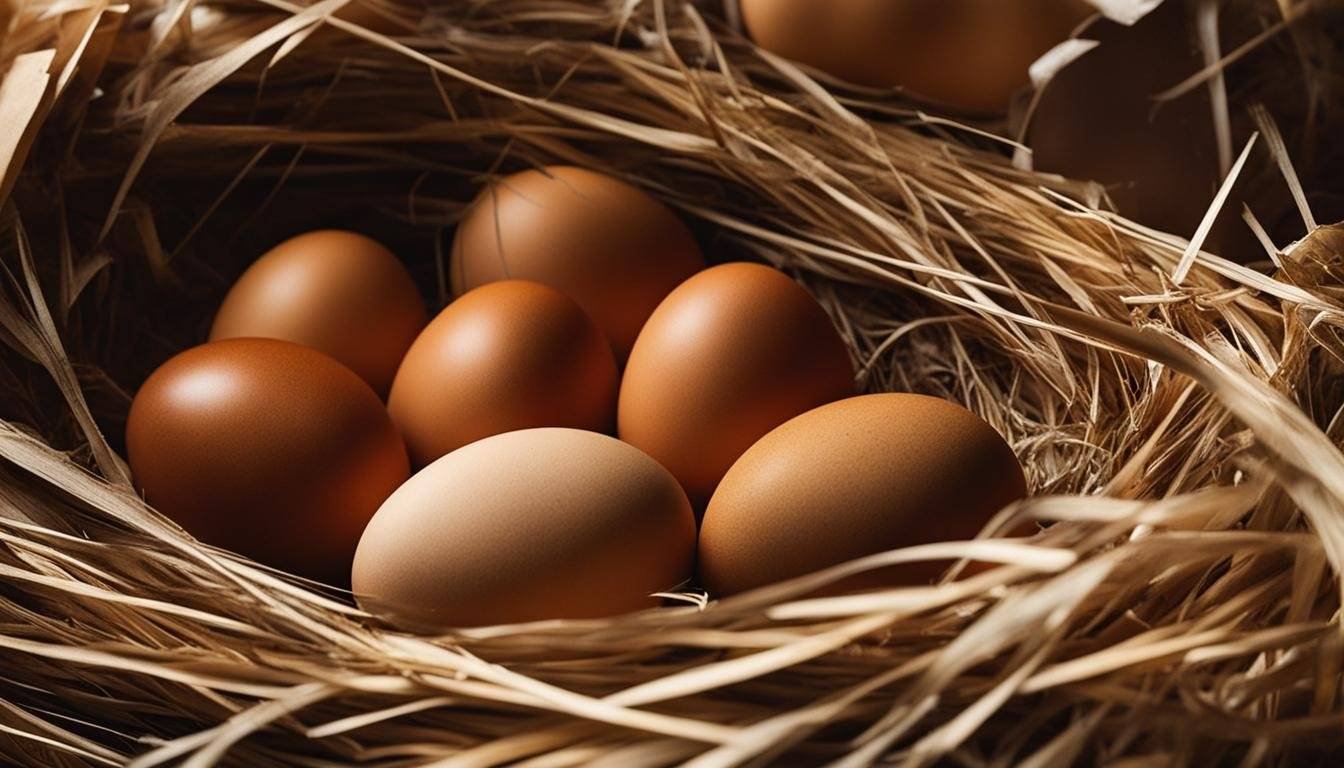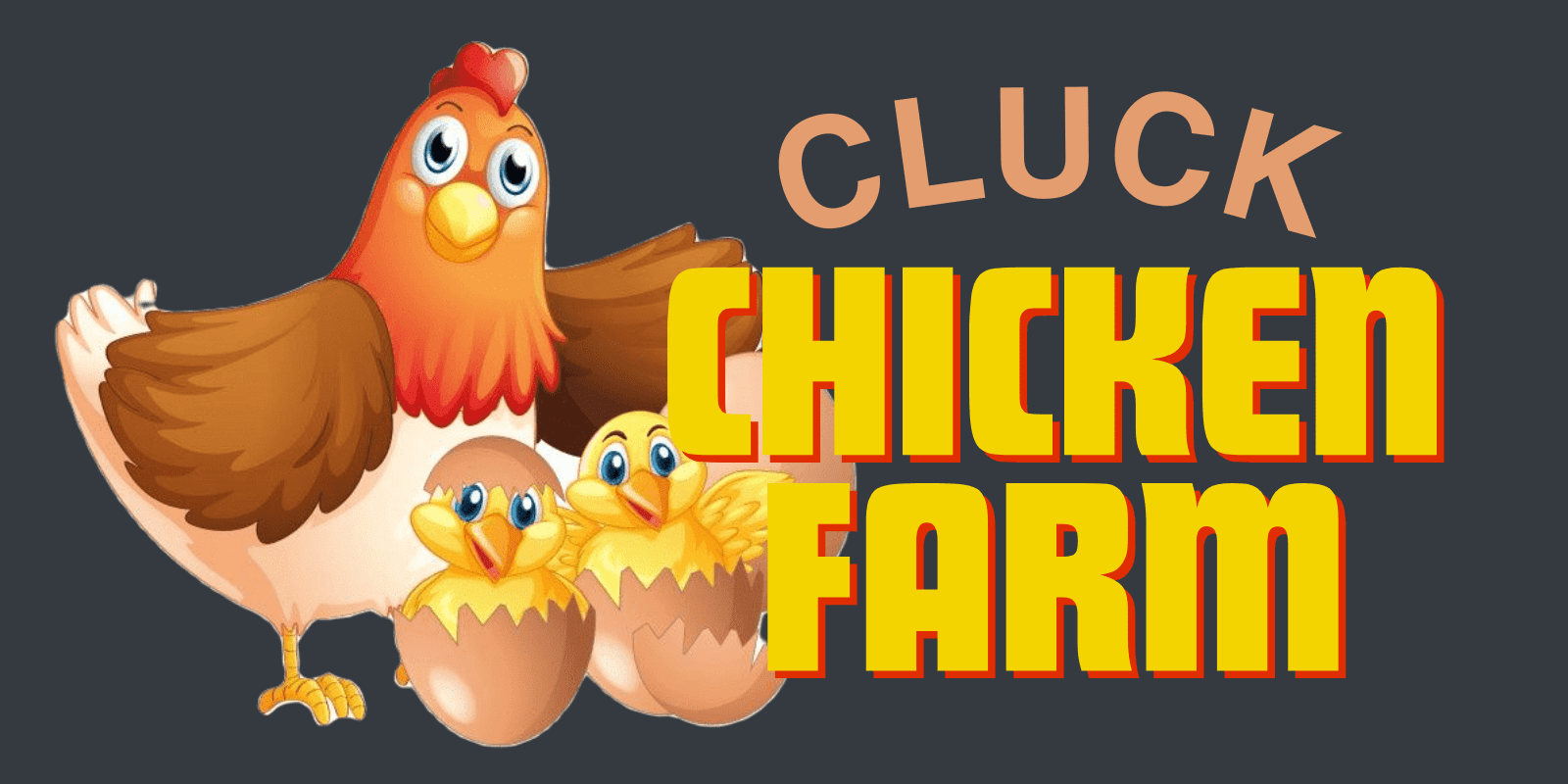When to switch from chicks starter to grower feed? Transitioning from chick starter to grower is an important step in raising healthy chickens. As chicks grow, their nutritional needs change, and it’s essential to provide them with the right feed at each stage of their development.
Chick starter feed is designed specifically for baby chicks, providing them with the necessary nutrients and high protein content they need for optimal growth. However, as chicks reach around 8 weeks old, it’s time to make the switch to grower feed.
Grower feed supports the healthy development of young chickens, providing them with the balanced nutrition they require at this stage. It has a slightly lower protein content than chick starter feed, focusing on promoting healthy growth and development.
By switching from chick starter to grower feed at the right time, you’re ensuring that your flock receives the appropriate nutrients for their current stage of growth. This switch is crucial for their overall health and well-being.
Be sure to follow feeding guidelines and consult with experts or your local poultry supplier for specific recommendations based on your chickens’ needs. Transitioning them from chick starter to grower feed will contribute to their successful growth into healthy and productive chickens.
Importance of Age-Appropriate Poultry Feed
Age-appropriate poultry feed plays a vital role in the proper growth and development of chickens. As young chicks mature, their nutritional needs change. Understanding when to transition from chick starter to grower feed is essential to ensure their health and well-being.
Chick Starter to Grower Feeding Schedule:
| Age | Feed Type |
|---|---|
| Birth to 8 weeks | Starter Feed |
| 8 weeks and onward | Grower Feed |
Chick starter feed is specifically formulated to meet the nutritional needs of baby chicks. It contains high levels of protein and essential nutrients to support their bone health and immunity. Feeding them starter feed for the first 8 weeks of their life ensures they receive the necessary nutrients for optimal growth and development.
After 8 weeks, transitioning chicks from starter to grower feed is crucial. Grower feed has a slightly lower protein content compared to starter feed. It is designed to provide the right balance of nutrients needed for healthy development as chicks transition into young chickens.
When switching from chick starter to grower feed, it is important to follow a feeding schedule to ensure a smooth transition. Gradually introduce the grower feed into their diet while slowly reducing the amount of starter feed. This helps prevent digestive issues and allows their bodies to adjust to the new feed effectively.
When to Start Using Grower Feed for Chicks:
It is recommended to start using grower feed for chicks around 8 weeks of age. However, it is essential to monitor their growth and development. If your chicks are still exhibiting signs of immaturity or seem underdeveloped at 8 weeks, you can continue feeding them starter feed until they are ready for the transition to grower feed.
Transitioning Chicks from Starter to Grower Feed
- Begin by mixing a small portion of grower feed with their regular starter feed.
- Gradually increase the proportion of grower feed over a period of 1-2 weeks.
- Monitor the chicks’ behavior and overall health during the transition period.
- Ensure a fresh and clean water source is always available to keep them hydrated.
- Once fully transitioned to grower feed, continue feeding them this type of feed until they are ready for the next stage in their growth.
By providing age-appropriate poultry feed and following the recommended feeding schedule, you can support the healthy growth and development of your chicks. Remember to consult with local experts or your trusted poultry supplier for specific guidance based on the needs of your flock.
Choosing the Right Feed for Each Stage
Proper nutrition is crucial for the healthy development of chickens at every stage of their growth. As chicks transition from the baby stage to adolescence, their dietary needs change, and it becomes important to provide them with the appropriate feed. Here’s a guideline on when to change from chick starter to grower feed, ensuring your flock receives the essential nutrients for their current stage of growth.
1. Starter Feed for Baby Chicks:
From birth to around 8 weeks old, baby chicks should be fed starter feed, specially formulated to meet their high protein and nutrient needs during this crucial developmental period. Starter feed helps establish a strong foundation for healthy bone growth and boosts their immune system.
2. Transitioning to Grower Feed:
At approximately 8 weeks old, it’s time to make the switch from chick starter to grower feed. Grower feed has a slightly lower protein content compared to starter feed, catering to the changing nutritional requirements of young chickens. It provides the necessary nutrients for their continued growth and development, preparing them to transition into adulthood.
3. Key Nutrients in Grower Feed:
Grower feed contains a balanced blend of proteins, minerals, and vitamins that optimize the growth of young chickens. It supports muscle development, feather growth, and overall vitality. The specific nutritional composition may vary depending on the brand, but be sure to choose a high-quality grower feed that meets the nutritional needs of your flock.
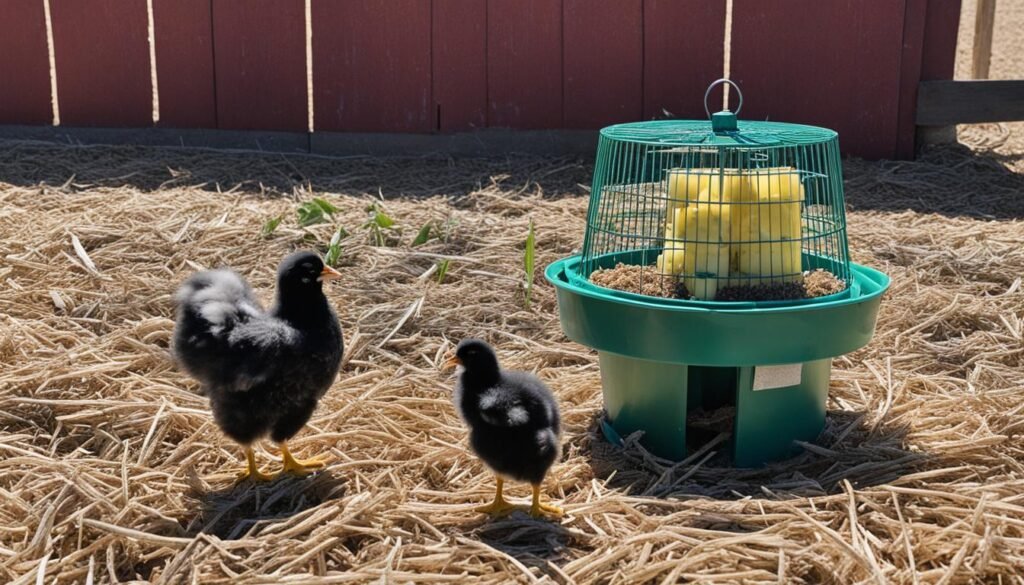
Timing is crucial when transitioning from chick starter to grower feed. Delaying the switch can lead to imbalanced nutrition, while introducing grower feed too early can result in inadequate protein intake. By following the recommended timeline, you can ensure that your chickens receive the right nutrients at each stage of their development, setting them up for optimal health and vitality.
5. Monitoring Growth and Health:
As your chicks transition to grower feed, it’s essential to monitor their growth and overall health. Regularly observe their appearance, activity level, and feed consumption to ensure they are thriving. Any significant changes in behavior or health should be promptly addressed to maintain the well-being of your flock.
Providing age-appropriate feed is key to raising healthy, strong chickens. Switching from chick starter to grower feed at the right time supports optimal growth and development. Remember to consult with poultry experts or your local feed supplier for specific recommendations based on the breed and nutritional needs of your chickens.
Nutritional Needs of Chickens
Chickens, just like any living creatures, have specific nutritional needs that must be met to support their growth and overall health. To ensure that your chickens develop into healthy and productive birds, it is essential to provide them with a balanced diet that fulfills their nutritional requirements at every stage of their growth.
A complete diet for chickens should include a variety of essential nutrients, including proteins, amino acids, vitamins, minerals, prebiotics, probiotics, calcium, and magnesium. These nutrients serve different purposes in the chickens’ bodies and play crucial roles in their bone development, immune function, and overall well-being. By providing a well-rounded diet, you can help your chickens reach their full potential.
When it comes to feeding young chicks, starter feed is the ideal choice. This feed is specifically formulated to meet the nutritional needs of baby chicks, with a protein content ranging from 16% to 20%. Additionally, starter feed enriched with omega-3s can provide additional health benefits for your chicks.
As your chicks grow older and reach the 8-week mark, it is time to transition them from chick starter feed to grower feed. Grower feed is designed to support healthy development in young chickens and has a slightly lower protein content than starter feed. It is important to make this switch at the right time to ensure that your chickens receive the appropriate nutrients for their current stage of growth.
For adult hens, layer feed becomes the primary feed choice. This feed is specifically formulated to support the nutritional needs of hens that are producing eggs. Layer feed typically has a higher calcium and protein content to promote egg production and maintain overall health in laying hens.
| Chickens’ Nutritional Needs | Feeding Stage | Ideal Feed |
|---|---|---|
| Proteins, amino acids, vitamins, minerals, prebiotics, probiotics, calcium, and magnesium | Baby Chicks (0-8 weeks old) | Starter Feed |
| Essential nutrients for healthy development | Pullets (8-16 weeks old) | Grower Feed |
| Higher calcium and protein content | Adult Hens (Laying) | Layer Feed |
The Importance of Providing the Right Nutrients
Providing the right nutrients at each stage of your chickens’ growth is crucial for their optimal health and productivity. If chickens do not receive the necessary nutrients, they may suffer from stunted growth, weakened immune systems, poor egg quality, and other health problems.
By understanding the nutritional needs of chickens and selecting the appropriate feed for each stage, you can ensure that your flock thrives. Remember to follow a consistent feeding schedule and regularly monitor the health and well-being of your chickens. If you have any concerns or questions regarding their diet, consulting with poultry experts or your local feed supplier can provide valuable guidance.
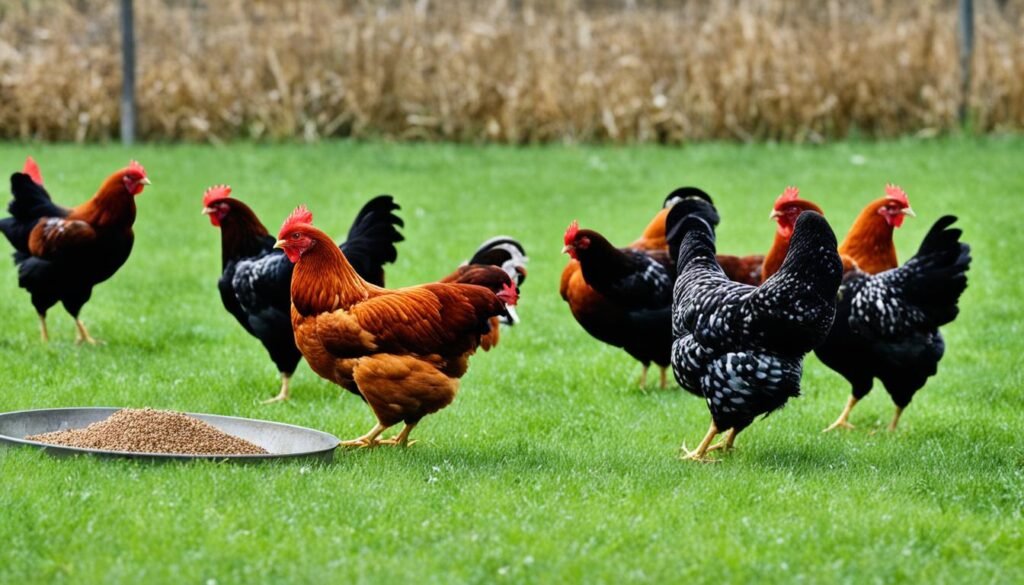
Feeding your chickens a balanced diet that meets their nutritional requirements is essential for their overall health and well-being. Providing the right nutrients at the right time helps support their growth, immune function, and egg production. By making the transition from chick starter feed to grower feed at the appropriate time, you lay the foundation for healthy development in your chickens. Invest in their nutrition, and you will reap the rewards of a thriving and productive flock.
Conclusion
Switching from chick starter to grower feed at the right time is essential for the healthy growth and development of your chickens. As your chicks transition into pullets, their nutritional needs change, and it is crucial to provide them with age-appropriate feed.
It is recommended to feed starter feed to baby chicks for the first 8 weeks of their life. This feed is specially formulated to meet their high protein and nutrient requirements during this crucial stage. Once your chicks reach 8 weeks old, it is time to transition them to grower feed.
Grower feed is designed to support the healthy development of young chickens. It has a slightly lower protein content and a balanced mix of essential nutrients to promote proper growth and bone health. Feeding your pullets with grower feed from 8 to 16 weeks old will help ensure that they receive the appropriate nutrition for this stage of their growth.
Remember, following a proper feeding schedule and providing your chickens with the right nutrients at each stage is vital for their overall health and productivity. It is always recommended to consult with experts or your local poultry supplier for specific recommendations based on your chickens’ needs.
